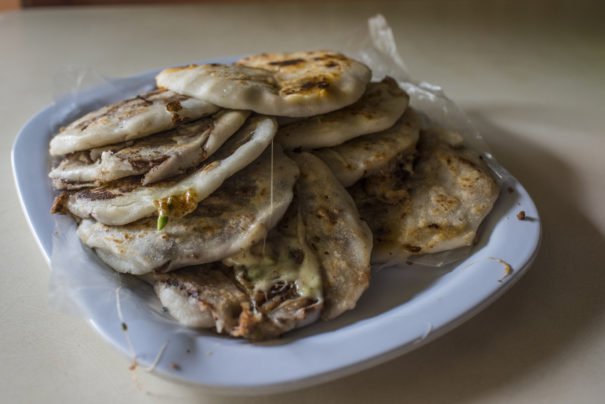
A Breakfast Worthy of an International Incident

A Breakfast Worthy of an International Incident
Pupusas in El Salvador
A week after landing in El Salvador, we arrived in the cheesy mecca of pupusas: Olocuilta, a small village north of San Salvador, and the birthplace of the Salvadorian breakfast staple.
Inside pupuserías, balls of corn dough are made to order and packed with beans and cheese and other fillings before being thrown on the griddle by the pupusa-makers, who are overwhelmingly women. The dough is cooked until golden brown, wrapped in wax paper, and served in plastic baskets. Served off the griddle, the often too-hot pupusas will burn your fingers and mouth. Each bite is filled with an unforgettable blend of cheese and beans, or cheese and chicharrón, or a number of other combinations, sometimes involving carrots, potatoes, or even crab. They’re served with curtido, a spicy version of coleslaw with chilies.
My Salvadorian friends teased me about wanting to eat pupusas all the time. Though it’s traditionally a breakfast food, its rising popularity has made it an all-day staple, but most locals will only eat them in the morning and evening. Most pupuserías close or slow down in the afternoon.
A pupusería is a tight ship. Every person has a specific task. Some take orders and clean the tables, while others run the griddle, expertly turning each pupusa at just the right time. Others pack the pupusas with fillings. Each punch of the dough makes a resounding smack as the air leaves and the flavor settles. In Olocuilta, the pupuserías are arranged in a circle, known as the Pupusadrome. Every year, the stalls here band together to make the world’s largest pupusa, in a bid to get into the Guinness Book of World Records.
Naturally, the origins of such a beloved dish are disputed. In 2013, talks for the Central American Free Trade Agreement (CAFTA-DR) stalled while El Salvador and Honduras debated which country could rightfully claim this culinary delight, because both wanted to make it an exclusive export. After two days of this, archeologists were brought in to settle the matter. They sided with the Salvadorians, who are descended from the indigenous Pipil tribe believed to have first created pupusas. Honduras had to concede.
Recently, the snack has migrated north to several U.S. cities. But nothing can replace the sights and smells of El Salvador’s original Pupusadrome.
Reporting for this story was supported by the International Women’s Media Foundation.